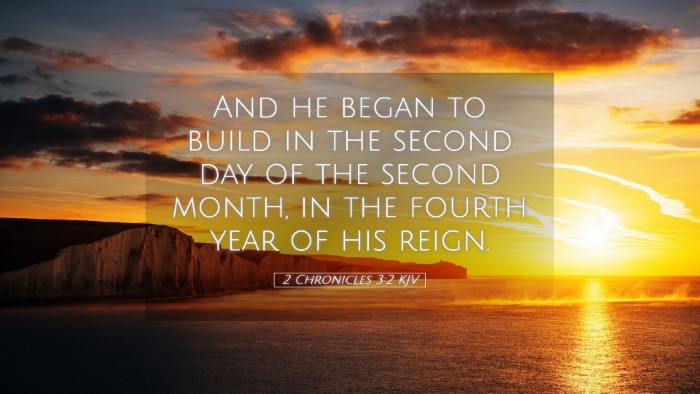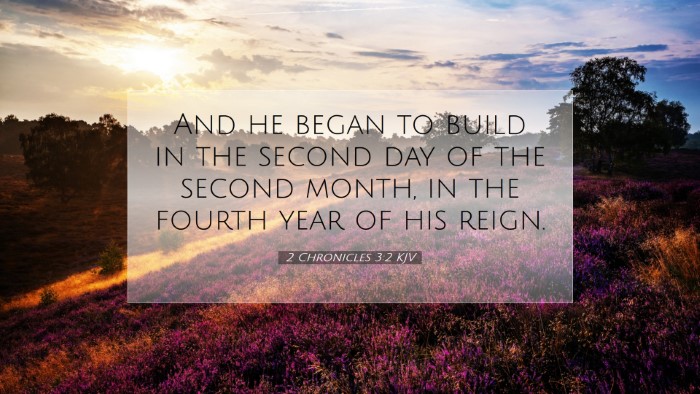Commentary on 2 Chronicles 3:2
Verse: "And he began to build in the second day of the second month, in the fourth year of his reign, the house of the LORD."
Introduction
This verse marks a significant moment in the history of Israel, as it initiates the construction of Solomon's Temple. To fully appreciate its depth, we must delve into the historical and theological implications of this action as seen in various public domain commentaries.
Contextual Background
The building of the Temple was prophesied by David, Solomon's father, and it held immense significance for the nation of Israel, symbolizing God's dwelling among His people. Solomon’s choice to begin this monumental task in the fourth year of his reign highlights the importance of timing in fulfilling divine mandates.
Matthew Henry's Insights
Matthew Henry emphasizes the providence of God seen in the timeline of the building project. He notes that the second day of the second month not only marks a specific date but also aligns with the Israelite calendar, indicating an orderly approach to sacred tasks. Henry highlights that Solomon's dedication to the LORD is evident in the meticulous way he embarks on the Temple's construction.
Albert Barnes' Commentary
Albert Barnes further elaborates on the significance of the timing specified in the verse. He states that the choice of the second month was not random but aligned with Jewish traditions and practices, particularly in relation to the Passover. This indicates an intentionality in Solomon’s leadership, linking the Temple’s construction to the covenant relationship between God and Israel.
Adam Clarke's Observations
Adam Clarke provides a detailed timeline, placing Solomon's reign within the larger framework of Israel's history. He notes that the fourth year represents a turning point where Solomon shifts from consolidation of power to the establishment of religious identity through the Temple. Clarke underscores the spiritual and national implications of the building, viewing it as an act of devotion and a physical manifestation of God's presence.
Theological Implications
The construction of the Temple transcends the physical act; it reverberates with theological meaning. It serves as a reminder of God’s holiness and His desire to dwell among His people. The Temple is a focal point for worship, sacrifice, and national identity.
Symbolism of the Temple
Throughout scripture, the Temple symbolizes God’s presence. The act of building the Temple signifies Solomon's commitment to ensuring that God remains at the center of Israel's identity. As elaborated in several commentaries, the physical structure reflects God’s nature—majestic, holy, and worthy of reverence.
Implications for Leadership
For pastors and leaders today, Solomon’s undertaking serves as a model of responsible stewardship. It underscores the importance of initiating God’s work with careful planning and dedication, as noted by both Matthew Henry and Albert Barnes. Leaders are called to build environments that cultivate worship and reflect God’s glory.
Reflection on Worship
The act of constructing the Temple invites reflection on our own worship practices. How do we prepare for worship in our communities? Are we as intentional about our spiritual architecture as Solomon was with the Temple? This text urges us to consider what it means for Christ to dwell among us today, as the ultimate fulfillment of the Temple's purpose.
Conclusion
2 Chronicles 3:2 not only serves as a historical marker but also as a rich source of theological reflection. The insights from Matthew Henry, Albert Barnes, and Adam Clarke illuminate the broader implications of Solomon’s actions, encouraging modern readers to embrace the importance of place, purpose, and divine presence in their worship practices. This verse acts as a clarion call to build our lives and communities as temples for the Lord, reflecting His glory and engaging in genuine worship.


